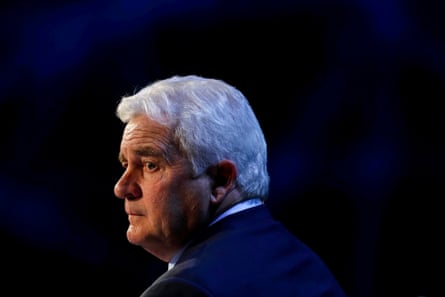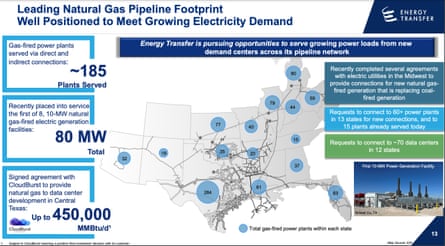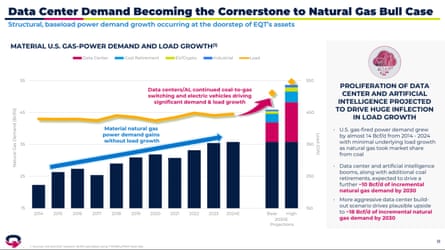Oil and gas barons who donated millions of dollars to the Trump campaign are on the cusp of cashing in on the administration’s support for energy-guzzling data centers – and a slew of unprecedented environmental rollbacks.
Energy Transfer, the oil and gas transport company behind the Dakota Access Pipeline, has received requests to power 70 new data centers – a 75% rise since Trump took office, according to a new investigation by the advocacy nonprofit Oil Change International (OCI) and the Guardian.
The fossil-fuel gold rush threatens to unleash massive amounts of pollution and greenhouse gases while undermining the renewable energy industry.
“Given Energy Transfer’s extensive natural gas infrastructure, we continue to believe that we are in the best position to capitalize on the anticipated rise in natural gas demand,” the company told investors in February.
The positive shareholder forecast came as Energy Transfer’s legal team were in a North Dakota court suing Greenpeace, claiming the environmental group had orchestrated the Standing Rock Indigenous-led protests – in what has been widely condemned as an attack on free speech by advocates and experts.
Energy Transfer, among the largest pipeline companies in the US, was the 13th-biggest corporate funder of Trump’s Make America Great Again Super Pac last year, according to OpenSecrets, donating $5m, while executive chair Kelcy Warren has been a major Republican donor since 2016.

The firm is part of the powerful fracked-gas industry set to use its influence on Trump and the Republican party to make billions in profits from cryptocurrency mining, AI and other data centers – which look likely to proliferate rapidly amid a slew of new incentives and regulatory rollbacks.
Data centers may have expanded regardless of last year’s election winner, but Trump’s victory means a much bigger and faster expansion – and a prioritization of fossil fuel over cleaner types of energy.
“The words that have replaced ‘energy transition’ are ‘AI’ and ‘data centers’,” Mike Sommers, from the powerful lobby group the American Petroleum Institute (API), recently said. “We’re transitioning from the energy transition to the energy reality … we’re going to need a lot more oil and gas.”
Energy Transfer’s first AI deal was announced the day before its investor meeting in February – a long-term agreement with CloudBurst to provide up to 450,000 cubic feet per day of fossil gas to their flagship AI-focused data center development in San Marcos, Texas. Burning this gas for electricity will generate 25,000 metric tons of greenhouse gases per day – the equivalent of 2.4 average US coal plants, according to the EPA greenhouse calculator, or 2.1m cars driven for one year.
“This project represents our first commercial arrangement to supply natural gas directly to a data center site, and it will not be the last,” the company told investors, who reacted favourably to the deal, with Energy Transfer’s share price rising 2.1% after it was announced.
“In aggregate, we have now received requests for potential connections to approximately 62 power plants that we do not currently serve in 13 states … In addition, we have now received requests from over 70 prospective data centers in 12 states,” investors were told by executives, outlining how the company is benefiting from the Trump data center and AI boom.
Energy Transfer slide shown to investors

Earlier this month, a jury with known ties to the fossil-fuel industry found in favor of Energy Transfer and ordered Greenpeace to pay the $65bn oil and gas company $660m in damages – an unprecedented figure that could bankrupt Greenpeace US and chill environmental activism. Greenpeace has said it will appeal.
Energy Transfer is not the only fossil-fuel firm ready to benefit from the expected boom in AI and cryptocurrencies. The Guardian/OCI investigation illustrates how the US fracked-gas industry in particular looks set to use its influence on Trump and the GOP to expand operations and make billions in profits from powering data centers – while dumping huge amounts of additional planet-warming gases and other toxins into the atmosphere.
The expected gas bonanza comes amid growing climate breakdown, including a slew of deadly and costly disasters in the US in recent months, such as the Los Angeles wildfires and Hurricane Helene in southern Appalachia. More than 150 “unprecedented” climate disasters struck around the world in 2024 – the hottest-ever year on record.
The crypto industry was last year’s biggest corporate campaign donor for the White House and Congress – and the candidates it backed won big, including Trump. But even before the latest push, US authorities believed that crypto mining was responsible for up to 2.3% of the nation’s total electricity demand – roughly equivalent to the state of West Virginia.
According to investment bank Goldman Sachs, the data-center-and-AI boom means that US power demand is “likely to experience growth not seen in a generation”. And this demand for energy, largely fuelled by fracked gas, is set to soar under Trump, who embraced cryptocurrencies during the campaign, posting on his Truth Social platform last summer that Bitcoin mining would “help us be ENERGY DOMINANT!!!”

Trump is now betting big on AI, too, signing several executive orders since taking office to slash regulation. This includes one on his first day to roll back safety-testing rules for AI used by the government, followed by another order three days later revoking existing policies “that act as barriers to American AI innovation”. Trump also announced private-sector investment of up to $500bn to fund infrastructure for artificial intelligence, aiming to outpace rivals.
In recent weeks, Meta, Google, OpenAI and other tech companies have lobbied the Trump administration for more AI tax breaks and incentives, to block state laws and for access to federal data to develop the technology – as well as for easier access to energy sources for their computing demands.
Tech companies “are really emboldened by the Trump administration, and even issues like safety and responsible AI have disappeared completely from their concerns”, Laura Caroli, a senior fellow at the Wadhwani AI Center at the Center for Strategic and International Studies, a non-profit thinktank, told the New York Times.
Rachel Rose Jackson, director of climate research and policy at Corporate Accountability, said: “This investigation is a harrowing illustration of just how out of touch with reality this government is with the facts of climate science – and highlights the treacherous relationship between big tech and fossil fuels.
“Not only are fossil-fuel corporations literally fueling the ramp-up of AI data centers, but big tech works with fossil-fuel corporations to use AI to discover and extract oil that should never see the light of day.”
The gas industry – like the tech and crypto industries – is now set to reap the benefits of the data-center expansion.
EQT Corporation, a leading fracked-gas producer and pipeline company and another major Trump donor, recently told investors that data centers are becoming the “cornerstone of natural gas bull case” – in other words, the cornerstone of fossil gas expansion and shareholder profits.
In February, EQT, which is worth $32bn, told investors that the company was ideally placed to take advantage of a forecasted 10-18bn-cubic-feet increase in gas demand from AI, crypto, EVs and other data centers by 2030. This is a huge amount of extra fossil gas, which even at EQT’s lower forecast would generate as much carbon dioxide as 52 coal plants or 46.5m passenger cars over a year, according to the EPA calculator.
Said EQT: “We’ll see those opportunities across the country – but we’ll also see those largely in our backyard as well, especially given the proximity to the data center demand that’s taking place.”
Slide shown to EQT investors

The Mountain Valley pipeline (MVP), a joint venture in which the gas giant is the controlling shareholder and operator, provides “unique access” to the US south-east region, which is home to “burgeoning data center demand”, investors were also told.
The MVP, which stretches 300 miles (482km) from north-western West Virginia to southern Virginia and was pushed through by the Biden administration in 2023 despite court orders and environmental regulators blocking construction, looks set to boost the data-center boom – and EQT profits. “MVP capacity and long-term sales to the region’s largest utilities mean EQT’s natural gas can underpin power generation to support data-center build-out,” investors were told.
A couple of days after the investor call, CEO Toby Rice told CNBC’s influential investor-focused Mad Money TV show, “we firmly believe that natural gas is going to take the lion’s share of power demand to meet this growing AI demand need”.

“We need to unleash American energy,” added Rice, who has been lobbying politicians in Washington about the need to expand American fracked gas. “Build, baby, build. Thank goodness this administration will let this happen. It could not have happened at a more critical time in the face of this AI boom that is taking place.”
There are already almost 5,400 data centers in the US, 70% more than the next 10 largest markets combined, including China. They not only guzzle electricity, but also water. One large data center can consume as much as 5 million gallons of water per day, the equivalent to a town of up to 50,000 people.
EQT made a $250,000 donation to the Republican Senate Leadership Fund just days after Biden announced he would pause liquefied natural gas (LNG) export permits in January 2024. The Super Pac’s one stated goal is to build a Republican majority that will “defend America from Chuck Schumer and Senate Democrats’ destructive far-left agenda”.
EQT boss Rice personally donated more than $100,000 to Republican Pacs and candidates in the last election cycle, according to OpenSecrets.
Rice was also among a crew of 20 oil and gas executives at the infamous meeting with Trump at his Mar-a-Lago resort in Florida last April, in which he asked for donations of $1bn, which included fossil fuel giants ExxonMobil and Chevron and the influential lobby group the API.
But the meeting also included smaller but increasingly powerful fracking companies drilling and/or exporting gas, which have revitalized the American fossil energy scene over the last two decades. It was organized by the fracking boss Harold Hamm, who for years has helped craft Republican energy policies. Hamm, who picked cotton barefoot as a child before making billions from fracking, runs Continental Resources, among the US’s largest fracked-gas companies.
Also in attendance was longtime oil industry ally Doug Burgum, then governor of North Dakota, who was appointed secretary of the interior in Trump’s new administration. After the meeting, it was reported by the Washington Post that the oil and gas executives discussed how to try to meet Trump’s request for $1bn to help fund his election campaign. In return, Trump promised to roll back environmental regulations, auction off more oil and gas leases on federal lands and waters, reverse pollution standards for new cars, and end drilling restrictions in the Alaskan Arctic, among other vows.
The alleged “quid pro quo” event was later investigated by a group of high-ranking Democratic lawmakers including Sheldon Whitehouse, then the Senate finance committee chair, and Jamie Raskin from the congressional committee on oversight and accountability. “Such an obvious policies-for-money transaction reeks of cronyism and corruption,” they found.
A second fossil-fuel fundraiser for Trump was organised the following month, in May 2024, by Warren of Energy Transfer, Vicki Hollub from Occidental Petroleum, and Hamm, who has been called Trump’s energy whisperer. The event, which took place at a luxurious hotel in Houston where guests had to hand over their phones, was sponsored by Trump’s Make America Great Again Pac.
Hamm’s company, Continental Resources, donated $1m to the Maga Super Pac in April last year, the month after Hamm donated $614,000 to the Trump 47 Committee.
Many of those present at Trump’s fundraising events last April and May already had long-term funding relationships with the Republicans. Continental Resources and Energy Transfer are in the top 20 funders of Maga, according to OpenSecrets.
According to one analysis, big oil spent $445m throughout the last election cycle to influence Donald Trump and Congress – including pouring $96m into Trump’s re-election campaign and affiliated political action committees.
Big oil wins
Doug Burgum and Harold Hamm were back at Mar-a-Lago to celebrate Trump’s November election victory. Shortly after Trump declared an energy emergency on his first day back in the White House in January, Mike Sommers, head of the API, said: “American energy was on the ballot and American energy won.”
The API spent just over $13m in campaign donations and lobbying during the 2024 election cycle, according to OpenSecrets.
Speaking at Davos just days after Trump’s inauguration, EQT’s Rice said: “Our lives are going to get easier. Donald Trump is a very welcome change.”
The following month, during an Energy Transfer investor call, co-chief executive officer Thomas E Long, said: “My goodness, how wonderful is life after this election. When we have a president and an administration that love this country, that fully recognizes how blessed we are … and we have a businessman that built his career on trading, doing deals, negotiating, employing, creating numerous jobs throughout all the businesses that he’s been associated with.
“What an incredible excitement we have around this administration and what it’s going to do to mitigate just overwhelming regulation on all these assets, to streamline regulations.”
So far, dozens of environmental regulations have been slashed, either by executive order or EPA rollbacks, including the end to Biden’s 2024 pause on LNG exports and new rules for cleaner exhausts from tailpipes – industry requests shared by Hamm with the New York Times last May.
This includes plans to roll back 31 key environmental rules – on everything from clean air to clean water and climate change – announced on a single day in March by Trump’s EPA administrator, Lee Zeldin, who has been accused of endangering the lives of millions of Americans.
Trump’s funders and backers are especially going to benefit from Trump’s policies to restrict regulations in the AI sector as part of an attempt to outpace China to become the global leader. The US is currently home to just more than half the mega data centers in the world. And with Goldman Sachs suggesting $1tn will be spent on AI data centers in the next few years, a lot is up for grabs.
Artificial intelligence and the data centers used to feed the computing power will require huge amounts of energy, with the US government projecting that data-center demand will triple the domestic electricity demand within the next three years. A recent paper by Harvard Law School notes that utilities are now prioritising supplying data centers at the expense of American consumers, who face price rises.

Days after the election, it was reported that oil giants ExxonMobil and Chevron were jumping into the race to power AI data centers. Yet the fracking industry, including Energy Transfer and EQT, appear to consider themselves best placed to benefit from Trump’s pro-AI-and-data-center growth strategy.
When Trump announced last November that Burgum would be the new secretary of the interior and chair of the newly formed National Energy Dominance Council, he said Burgum’s work would be key to winning “the battle for AI superiority, which is key to national security and our nation’s prosperity”.
At his confirmation hearing, Burgum repeated the same message, claiming that without more fossil fuels, “we’re going to lose the AI arms race to China”.
“In his first term, President Trump unleashed American energy while reducing carbon emissions to historic lows, proving that we can both restore American greatness and advance environmental stewardship. President Trump is committed to replacing unclean foreign energy with the liquid gold under our feet while ridding our environment of dangerous toxins,” said Taylor Rogers, a White House spokesperson.
EQT, Energy Transfer, Continental Resources and the API were contacted for comment but did not respond.
“The most absurd part of this whole saga is that everyone who looks at it without a vested interest concludes that if we have to build data centers fast, it makes far, far more sense – economic and environmental – to use renewable energy,” said environmentalist Bill McKibben, founder of the non-profits 350.org and Third Act.
“But just as they shamelessly used the war in Ukraine, the gas industry is now using this moment to try and lock in their climate-killing business. And they’ve purchased enough friends in high places to make it a real possibility.”
Andy Rowell is a UK-based investigative reporter and contributing editor to Oil Change International

 20 hours ago
9
20 hours ago
9













































